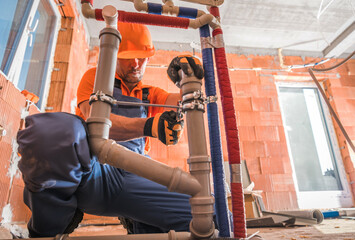Whether you’re looking for a new plumber or need a plumbing repair, finding one with the right experience and qualifications is essential. Getting the wrong person can lead to costly repairs and an uncomfortable experience. Plumbers are often called in for plumbing emergencies, such as a leaky faucet or drain. However, homeowners should also look for signs of water damage in their homes.

Plumber has the knowledge and skills necessary to install, repair and maintain piping and water systems. Their expertise includes reading and interpreting blueprints, using plumbing tools, and working with various materials. Plumbers must also display strong physical and mental strength when working in small, dark, or hot environments. Taking the time to exercise regularly can improve your stamina and flexibility, which will be helpful in this career.
Good customer service skills are important for plumbers because they often need to communicate with clients about their plumbing problems and explain how to fix them. These skills include empathy, patience, and friendliness.
Plumbing Experts must complete formal education to earn a license. These programs are available at local community colleges, trade institutions, vocational schools, unions, or professional plumbing associations. Apprenticeships are another way to learn the trade through on-the-job training. During your apprenticeship, you work with a licensed plumber under their supervision and receive hands-on instruction.
Various technical certifications are also available that verify your skills in different areas of the plumbing industry. These credentials can help you stand out from the competition and qualify for jobs in your preferred area. Depending on where you live, you may need to pass a practical exam or a written exam to get your license. Often, these exams cover trade knowledge and business and law related to the plumbing industry.
Although many homeowners can perform their plumbing maintenance and repairs, a few should be left to the pros. A plumbing expert can provide the best possible solution to the most common issues and problems with a specialized approach designed for each project. This is the only way to get the optimum performance out of your new system. The most common plumbing systems are typically comprised of a number of separate components, such as faucets, pipes, valves and fittings. The most efficient way to keep these components functioning is by applying key technologies and techniques. This will keep your home looking good and functioning properly, reducing the risk of damage, theft or even fire.
Plumbing Experts have many specialized tools and equipment to help them solve all kinds of plumbing issues. From clogged drains and leaky faucets to flooded pipes and discolored water, plumbers have the skills to repair these problems quickly and efficiently. Plungers are a common tool used by plumbers to unclog sinks, showers, and toilets. They also work well for minor clogs that might not be severe enough to require a larger plumbing tool like a drain snake.
Sewer jetting is another tool that plumbers use to clean out clogged drains. It entails using pressurized water to scour the inside of a sewer line, which can clean out grease and other residue. Plumbers also use inspection cameras, which are mounted on a long cable and can be maneuvered deep into drains to give them a better look at what’s causing the problem. They can then determine which tool is best equipped to fix the issue.
Plumbing systems have evolved over the centuries. Ancient Romans, for example, used lead pipes. However, lead used in plumbing solder was banned in drinking water in 1986. There are many alternatives to lead used for plumbing, including non-toxic plastics. Modern plumbing systems can use steel or cast iron pipes. Some of these materials are completely safe to use in plumbing. So, if you are concerned about your family’s safety, you can consult with a plumbing professional today.
Proper sizing of drain pipes is essential. The pipe size should be determined by how many fixtures it serves. Generally, drain pipes of four inches or more are necessary for a house’s sewage system. Materials used for house drains include cast iron, plastic, and lead.
Plumbing is an essential part of a commercial property. It brings water into a building and ensures safe drainage. It also helps move water, chemicals, and other fluids. For industrial purposes, plumbing is used for process piping. This system moves water, gases, and chemicals throughout a facility. If you want to know more about plumbing, you should consult a plumber. Choosing a plumbing company that is experienced in your industry is important.
